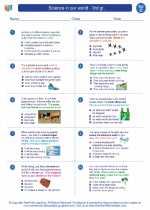Parasites: A Study Guide
Parasites are organisms that live on or inside another organism (the host) and benefit at the expense of the host. They can be found in various environments, including terrestrial, aquatic, and even within human bodies.
Types of Parasites
- Ectoparasites: These are parasites that live on the external surface of the host, such as lice, ticks, and fleas.
- Endoparasites: These are parasites that live inside the body of the host, such as intestinal worms and protozoa.
- Parasitoids: These organisms lay their eggs on or inside a host, and the larvae consume the host as they develop.
Life Cycle of Parasites
Parasites have complex life cycles that often involve multiple hosts. For example, some parasites lay eggs or release larvae into the environment, where they can infect other hosts. Others may have different life stages within different hosts before reaching maturity.
Effects on Hosts
Parasites can have various effects on their hosts, ranging from mild irritation to severe illness. They may compete for nutrients, cause tissue damage, or even alter the behavior of the host to facilitate their own survival and reproduction.
Prevention and Control
Preventing parasitic infections involves measures such as maintaining good hygiene, avoiding contaminated water or food, and using insect repellents. Control measures may include medications, vaccines, and environmental management to reduce parasite populations.
Study Questions
- What are the three main types of parasites?
- Describe the life cycle of a parasite that requires multiple hosts for its development.
- Discuss the potential effects of parasites on their hosts.
- What are some preventive measures for avoiding parasitic infections?
- Explain the concept of parasitoids and provide an example.
◂Science Worksheets and Study Guides Third Grade. Science in our world - 3rd gr.

 Worksheet/Answer key
Worksheet/Answer key
 Worksheet/Answer key
Worksheet/Answer key
 Worksheet/Answer key
Worksheet/Answer key
 Worksheet/Answer key
Worksheet/Answer key
